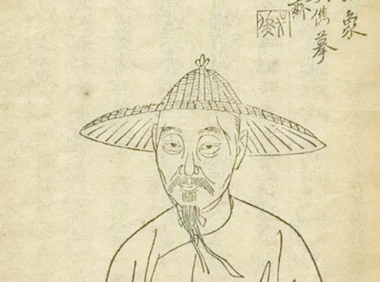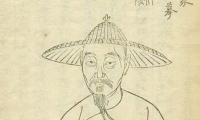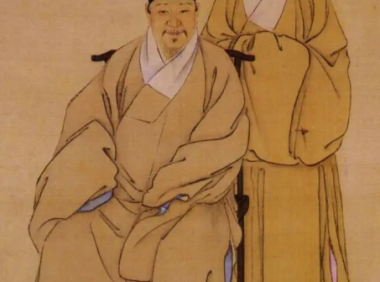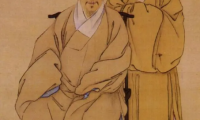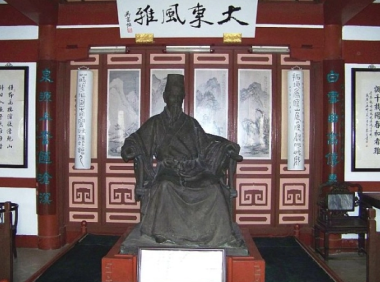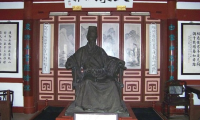-
Huang Jingren Poem: Parting from My Old Mother – 黄景仁《别老母》
别老母 [清]黄景仁 搴帷[1]别母河梁[2]去, 白发愁看泪眼枯。 惨惨柴门风雪夜, 此时有子不如无。 注释: [1]搴帷:掀起门帘。 [2]河梁:河上的桥,泛指送别之地。 Parting from My Old Mother Huang Jingren I leave my mother at the door for riverside, I gaze at her white hair and tearful eyes now dried. To have on snowy night a son not within call, It is no better than to have no son at all. "Farewell to My Mother" is a poem by Huang Jingren, a poet of the Qing Dynasty. This poem combines the reality of parting with the imaginary future, and describes the scenes the poet saw when he traveled far away and parted from his mother in straightforward language, expressing the poet's sincere feelings for his mother. The whole poem has no polished language, and what is beating in it is the poet's heart that has nowhere to rest. The poet uses plain language to express the feeling of parting appropriately and painfully. The emotion comes before the words are spoken, and the emotion is unbearable before the words are finished. The ending reaches a tragic state, and the feeling is desolate....
- 0
- 0
- 20
-
Xia Wanchun Poem: Adieu, My Homeland – 夏完淳《别云间》
别云间 [明]夏完淳 三年羁旅客[1], 今日又南冠[2]。 无限河山泪, 谁言天地宽! 已知泉路近, 欲别故乡难。 毅魄[3]归来日, 灵旗空际[4]看。 注释: [1]羁旅客:寄居他乡的人。 [2]南冠:代指囚犯。 [3]毅魄:英灵。 [4]空际:天空。 Adieu, My Homeland Xia Wanchun[1] I struggled three long years, Captive again today. My land's worth bitter tears. Could I come homeward way? I know my death is near; It's hard to leave my land. See when my soul comes here, I'll wave my flag in hand. 注释: [1]The poet carried out anti-Manchurian activities at the age of fifteen and was put to death at seventeen. "Farewell to the Clouds" is a five-character regulated verse. The poem begins with a description of the arduous and extraordinary life of wandering; continues with the grief and indignation over the loss of the homeland and the broken mountains and rivers; turns to express the deep affection for the homeland and relatives; and ends with the oath of determination to restore the country....
- 0
- 0
- 8
-
Li Panlong Poem: Farewell to a Banished Friend – 李攀龙《于郡城送明卿之江西》
于郡城[1]送明卿[2]之[3]江西 [明]李攀龙 青枫[4]飒飒[5]雨凄凄[6], 秋色遥看入楚迷。 谁向孤舟怜逐客[7], 白云相送大江西。 注释: [1]郡城:李攀龙的家乡济南。 [2]明卿:吴国伦,字明卿,江西兴国人。与李攀龙同为“后七子”之一,被贬谪为江西按察司知事,途经济南,李攀龙置酒送行,作此诗。 [3]之:到……去。 [4]青枫:苍翠的枫树。 [5]飒飒:形容风吹动树枝发出的声音。 [6]凄凄:此处形容雨的寒凉。 [7]逐客:被贬谪的客子,这里指吴国伦。 Farewell to a Banished Friend Li Panlong Green maple leaves are shivering in dreary rain: Autumn is veiled in mist on far-off Southern plain. Who would pity my banished friend in lonely boat? Only white clouds across the endless river float. 《于郡城送明卿之江西》是 明代诗人李攀龙的写的一首七言绝句 。全诗低沉含蓄,一往情深。前两句写送别的凄凉,虽然全是写景,更重要的是通过萧瑟秋色,体现了自己无尽的怅惘,三、四句直写,同时又以天上飘浮的白云寄托自己的情感,笔意洒脱,抒情味极浓。这其间有离别的黯然销魂,也有对友人遭贬的同情与愤慨,意在象外。 The poem "Farewell to a Banished Friend" is a seven-line poem written by Li Panlong, a poet of the Ming Dynasty. The whole poem is low and subtle, with deep feelings. The first two lines are about the desolation of the farewell, although they are all about the scenery, but more importantly, they reflect his endless despair through the sluggish autumn colors, while the third and fourth lines are straightforward, and at the same time, the white clouds floating in the sky are used to send his emotions. In between, there is the gloomy feeling of parting, as well as the sympathy and indignation for the depreciation of a friend....
- 0
- 0
- 19













